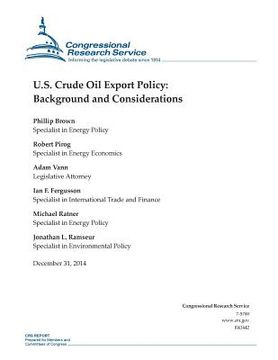U.S. Crude Oil Export Policy: Background and Considerations (en Inglés)
Reseña del libro "U.S. Crude Oil Export Policy: Background and Considerations (en Inglés)"
During an era of oil price controls and following the 1973 Organization of Arab Petroleum Exporting Countries oil embargo, Congress passed the Energy Policy and Conservation Act of 1975 (EPCA), which directs the President "to promulgate a rule prohibiting the export of crude oil" produced in the United States. Crude oil export restrictions are codified in the Export Administration Regulations administered by the Bureau of Industry and Security (BIS)-a Commerce Department agency. Generally, U.S. crude oil exports are prohibited, although there are a number of exemptions and circumstances under which crude oil exports are allowed. The President has authority to allow certain crude oil exports if an exemption is determined to be in the national interest. In 2009, a decades-long U.S. oil production decline was reversed due to the application of advanced drilling and extraction technologies to produce tight oil, generally light/sweet crude primarily located in Texas and North Dakota. Limited demand for tight oil and condensate being produced in the Texas/Gulf Coast region may result because certain refiners in that region are currently configured to process heavier crudes. As a result, oil producers and industry analysts are projecting an oversupply of light oil, which could lead to price discounts and lower production should export restrictions remain. However, the industry is dynamic, and refiners can modify operating configurations and add equipment in order to accommodate more light crude volumes. Price discounts may be needed to motivate such changes. The effect on domestic gasoline prices is a major consideration, among several, associated with allowing crude oil exports. Commercial studies and federal government analysis suggests that gasoline prices are correlated to international crude oil prices-since gasoline and other petroleum products can be exported without restriction-and U.S. gasoline prices could possibly decrease if crude oil exports were allowed. However, the projected decreases-assuming $100 per barrel crude oil prices-are relatively small and range from $0.02 to $0.12 per gallon. Congress may choose to consider crude oil export policy options that could range from maintaining existing restrictions to eliminating the prohibition on crude oil exports. During the 113th Congress, four bills were introduced that would have eliminated crude oil export restrictions: H.R. 4286, H.R. 4349, S. 2170, and H.R. 5814. Some Members of Congress have expressed the desire to maintain crude oil restrictions. However, maintaining restrictions might not prevent more crude-oil-like material from being exported, because varying interpretations of existing regulations may allow for more exports. The crude oil definition in the export regulations is open to interpretation and has many undefined terms that the industry may explore with the objective of determining the minimum amount of crude oil processing necessary that would result in an exportable product. It is not clear how broadly or narrowly BIS might interpret existing laws and regulations. Finally, Congress may choose to explore other options between eliminating and maintaining restrictions. Examples may include allowing exports of lease condensate-an ultralight hydrocarbon that is typically produced with natural gas-allowing unrestricted exports to Mexico since exports to Canada are not restricted, allowing a certain type of crude (i.e., light/sweet) from a certain location (i.e., Texas) to be exported-much like the California heavy crude oil export exemption-or allowing crude oil exports for a limited time period since U.S. oil production growth is uncertain and may, according to the Energy Information Administration, peak in 2020. The President has the authority to make national interest determinations that would allow for more crude oil exports.

